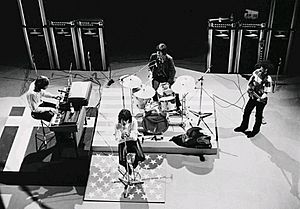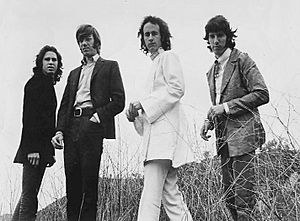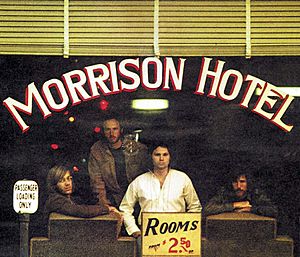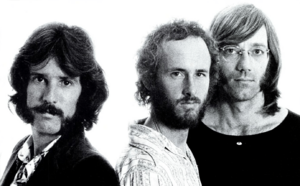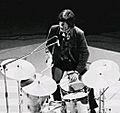The Doors facts for kids
Quick facts for kids
The Doors
|
|
|---|---|
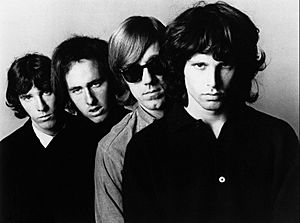
Promotional photo in late 1966. From left to right: John Densmore, Robby Krieger, Ray Manzarek, Jim Morrison.
|
|
| Background information | |
| Origin | Los Angeles, California, U.S. |
| Genres |
|
| Years active |
|
| Labels | Elektra, Rhino |
| Past members |
|
The Doors were a famous American rock band. They formed in Los Angeles in 1965. The band members were Jim Morrison (singer), Ray Manzarek (keyboard player), Robby Krieger (guitarist), and John Densmore (drummer).
The band got its name from a book called The Doors of Perception by Aldous Huxley. This book's title was inspired by a quote from the poet William Blake. The Doors signed with Elektra Records in 1966. With Jim Morrison, they released six studio albums in five years. Some of these albums are considered among the best ever. These include their first album, The Doors (1967), Strange Days (1967), and L.A. Woman (1971).
The Doors were very successful. By 1972, they had sold millions of albums and singles. Jim Morrison passed away in 1971. The remaining band members continued as a trio until 1973. They released three more albums in the 1970s. One of these albums included earlier recordings by Morrison. Over the years, the band members sometimes reunited to play music.
The Doors were the first American band to have eight gold LPs in a row. A gold LP means it sold 500,000 copies. They have sold over 34 million albums in the United States. Worldwide, they have sold more than 100 million records. This makes them one of the best-selling bands of all time. Magazines like Rolling Stone have called them one of the greatest artists ever. Rolling Stone ranked them 41st on its list of the "100 Greatest Artists of All Time". In 1993, The Doors were honored and added to the Rock and Roll Hall of Fame.
How The Doors Began

The Doors started when Jim Morrison and Ray Manzarek met by chance. This happened on Venice Beach in July 1965. They knew each other from attending the UCLA School of Theater, Film and Television. Morrison told Manzarek that he had been writing songs. Morrison later said that he was just writing down songs that were playing in his head. Manzarek encouraged him to sing. Morrison sang the first lines of "Moonlight Drive". Manzarek was inspired by these "cool and spooky" lyrics. He started thinking about the music he could play with them.
Manzarek was in a band called Rick & the Ravens. It was not very successful. John Densmore was a drummer playing with another band. He knew Manzarek from meditation classes. Densmore joined the group in August 1965. The five members, including bass player Patty Sullivan, formed The Doors. They combined different music styles. These included jazz, rock, blues, and folk music. On September 2, 1965, they recorded a six-song demo. This happened at World Pacific Studios in Los Angeles.
On August 10, 1966, Elektra Records president Jac Holzman saw them play. After Holzman and producer Paul A. Rothchild watched them, they signed The Doors. This happened on August 18. It was the start of a successful partnership with Rothchild and sound engineer Bruce Botnick.
Rising to Fame
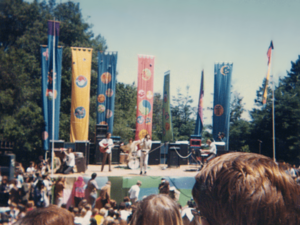
The Doors recorded their first album, The Doors, around August 1966. They recorded it at Sunset Sound Studios. The album was released in January 1967. It included many popular songs they already played. In early 1967, the band appeared on The Clay Cole Show. They performed their song "Break On Through". This song did not become a big hit.
So, the band focused on "Light My Fire". This song became the first single from Elektra Records to reach number one. It topped the Billboard Hot 100 singles chart. It sold over one million copies. The Doors made their first international TV appearance in May 1967. They performed "The End" for the Canadian Broadcasting Corporation (CBC) in Toronto.
Hit Albums and Songs
The Doors spent weeks recording their second album, Strange Days. They used new technology like the Moog synthesizer. Strange Days did not sell as well as their first album. It reached number three on the Billboard album chart but quickly dropped. The song "People Are Strange" from this album inspired the name of a 2009 documentary about the band.
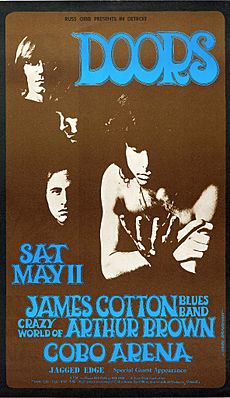
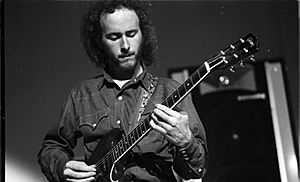
Waiting for the Sun became their first album to reach number one in the US. The song "Hello, I Love You" was their second US number one hit. This song was one of the six songs they recorded in their 1965 demo. They ended 1968 with a successful new song, "Touch Me". It reached number three on the Billboard Hot 100. It was their third and last American number-one single.
The Doors' fourth album, The Soft Parade, came out in July 1969. It was their only album to feature brass and string music. The producer, Paul Rothchild, suggested this idea. Both John Densmore and Ray Manzarek liked the idea. Jim Morrison did not want orchestral music on his songs. The song "Touch Me" featured saxophonist Curtis Amy.
The Soft Parade was a very successful album. By this time, Jim Morrison felt distant from the music. He wanted to leave the band. But Manzarek convinced him to stay for six more months.
The Doors returned to a more traditional sound with their fifth album, Morrison Hotel, in 1970. This album had a strong blues rock sound. The first song was "Roadhouse Blues". The album reached number four in the United States. It helped the band regain popularity with their fans and music critics. Critics praised it as "good hard, evil rock" and one of the best albums of the decade. Jim Morrison returned as the main songwriter for this album. The 40th anniversary CD of Morrison Hotel includes extra songs and different versions.
Live Performances and Jim Morrison's Passing
July 1970 saw the release of the band's first live album, Absolutely Live. It reached number eight on the music charts. The producer, Paul Rothchild, put the album together from many different concerts. He said there were "2000 edits on that album." Absolutely Live also included the long song "Celebration of the Lizard."
On December 8, 1970, his 27th birthday, Jim Morrison recorded more poetry. Some of this poetry was later used on the album An American Prayer in 1978. Soon after, the band had a short tour to promote their next album. They played two concerts in Dallas on December 11. These were The Doors' last public performances with Jim Morrison. On July 3, 1971, Jim Morrison was found to have passed away. He was 27 years old.
The Band After Jim Morrison
The album Other Voices was being planned while Jim Morrison was in Paris. The band thought he would come back to help finish it. After Morrison passed away, the remaining members thought about finding a new singer. They considered Iggy Pop for vocals. But neither of these ideas worked out. So, Robby Krieger and Ray Manzarek became the lead singers themselves. Other Voices was finished in August 1971 and released in October 1971.
The recordings for Full Circle happened a year after Other Voices, in spring 1972. The album was released in August 1972. For their tours during this time, The Doors had Jack Conrad on bass guitar. They also had Bobby Ray Henson on rhythm guitar. They went on a European tour. This included shows in France, Germany, the Netherlands, and the United Kingdom. They also appeared on the German TV show Beat-Club. Like Other Voices, Full Circle did not sell as well as their earlier albums. Full Circle added elements of funk and jazz to The Doors' sound. But the band struggled with Manzarek and Krieger as lead singers. None of the albums after Morrison reached the Top 10. All six of their albums with Morrison had. The Doors disbanded in 1973 after their contract with Elektra ended.
The third album released after Morrison, An American Prayer, came out in 1978. For this album, the band added music to Jim Morrison's recorded poetry. The album was a commercial success. It received a platinum certificate, meaning it sold over one million copies. Two years later, it was nominated for a Grammy Award. An American Prayer was updated and re-released with extra songs in 1995.
In 1993, The Doors were honored and added to the Rock and Roll Hall of Fame.
Members' New Paths
After Jim Morrison passed away in 1971, John Densmore and Robby Krieger went to London. They were looking for a new lead singer. They formed a band called the Butts Band in 1973. They released an album called Butts Band that same year. The band broke up in 1975 after a second album.
Ray Manzarek made three solo albums from 1974 to 1983. He also formed a band called Nite City in 1975. This band released two albums in 1977–1978. Robby Krieger released six solo albums from 1977 to 2010. In 2002, Manzarek and Krieger formed a new version of The Doors. They called it the Doors of the 21st Century. Because of legal issues over using The Doors' name, they changed their name several times. They eventually toured as "Manzarek–Krieger" or "Ray Manzarek and Robby Krieger of the Doors".
On May 20, 2013, Ray Manzarek passed away at age 74. He had complications from bile duct cancer. Krieger and Densmore came together on February 12, 2016. They played at a benefit concert in memory of Manzarek. All the money raised went to "Stand Up to Cancer."
Awards and Achievements
- In 1993, The Doors were inducted into the Rock and Roll Hall of Fame.
- In 1998, their song "Light My Fire" was added to the Grammy Hall of Fame.
- In 1998, VH-1 ranked The Doors number 20 on its list of the 100 Greatest Artists of Rock and Roll.
- In 2000, The Doors were ranked number 32 on VH1's 100 Greatest Hard Rock Artists. "Light My Fire" was ranked number seven on VH1's Greatest Rock Songs.
- In 2002, their first album, The Doors, was inducted into the Grammy Hall of Fame.
- In 2004, Rolling Stone ranked The Doors 41st on its list of 100 Greatest Artists of All Time.
- Also in 2004, Rolling Stone magazine's list of The 500 Greatest Songs of All Time included two of their songs: "Light My Fire" at number 35 and "The End" at number 328.
- In 2007, The Doors received a Grammy Lifetime Achievement Award.
- In 2007, The Doors received a star on the Hollywood Walk of Fame.
- In 2010, "Riders on the Storm" was inducted into the Grammy Hall of Fame.
- In 2011, The Doors received a Grammy Award for Best Long Form Music Video. This was for the film When You're Strange.
- In 2012, Rolling Stone magazine's list of Rolling Stone's 500 Greatest Albums of All Time included three of their albums: The Doors at number 42, L.A. Woman at number 362, and Strange Days at number 407.
- In 2014, The Doors received the "Inspiration" Award from British Classic Rock magazine's readers.
- In 2015, the Library of Congress chose The Doors album for the National Recording Registry. This was because of its cultural, artistic, or historical importance.
- In 2016, The Doors received a Grammy Award for Favorite Reissues and Compilation. This was for the live album London Fog 1966.
- On January 4, 2017, the city of Los Angeles declared it "The Day of the Doors". This honored the 50th anniversary of their first album.
- In 2018, the film Break on Thru: Celebration of Ray Manzarek and The Doors won the best length feature at the Asbury Park Music & Film Festival.
- In 2020, Rolling Stone listed the 50th Anniversary Deluxe Edition of Morrison Hotel among "The Best Box Sets of the Year".
Music Albums
- Studio albums
- The Doors (1967)
- Strange Days (1967)
- Waiting for the Sun (1968)
- The Soft Parade (1969)
- Morrison Hotel (1970)
- L.A. Woman (1971)
- Other Voices (1971)
- Full Circle (1972)
Images for kids
See also
 In Spanish: The Doors para niños
In Spanish: The Doors para niños
 | Emma Amos |
 | Edward Mitchell Bannister |
 | Larry D. Alexander |
 | Ernie Barnes |


